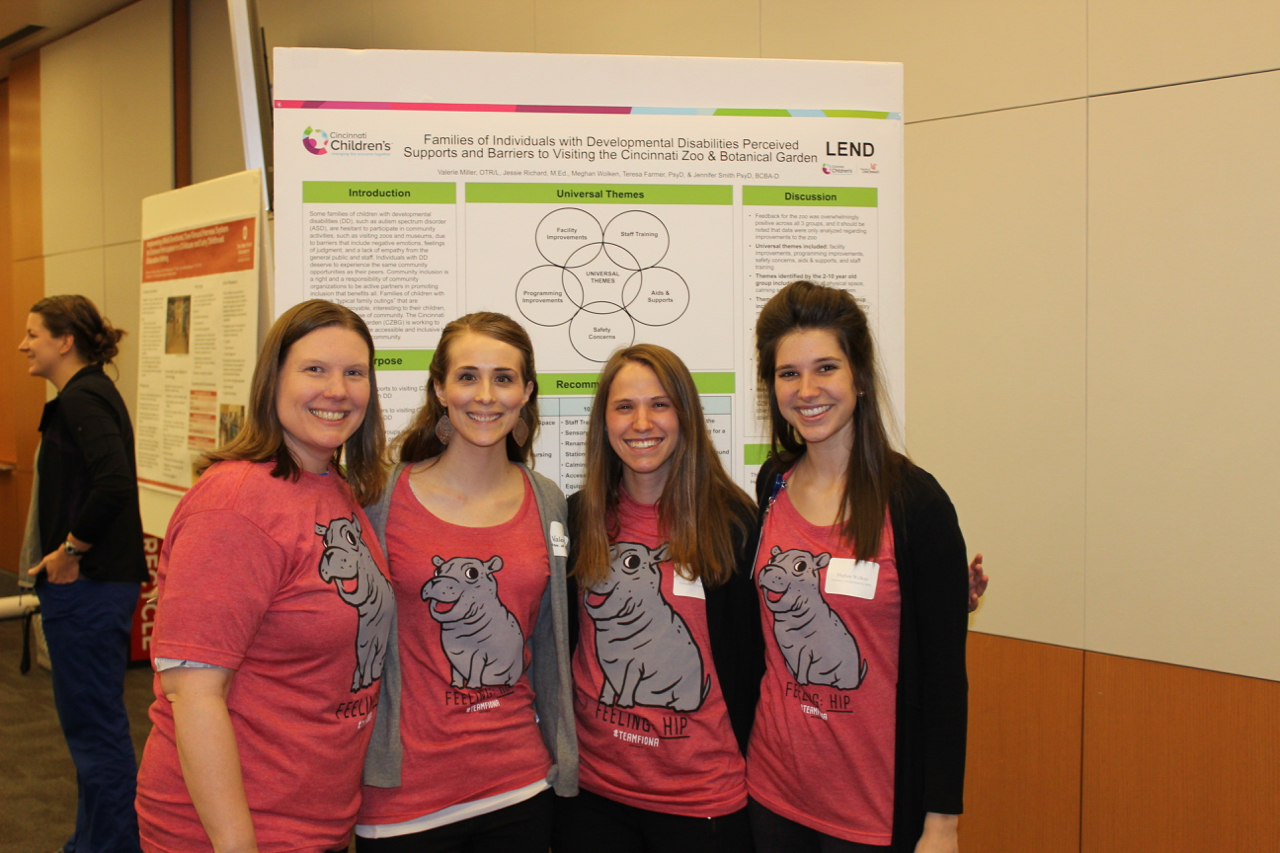 Congratulations to the University of Cincinnati LEND project, Families of Individuals with Developmental Disabilities Perceived Supports and Barriers to Visiting the Cincinnati Zoo & Botanical Garden, for winning first place in Ohio MCH Training Programs Poster Session (Team members Valerie Miller, OTR/L; Jessie Richard, MEd; Meghan Wolken; Teresa Farmer, PsyD; Jennifer Smith PsyD., BCBA-D)
Congratulations to the University of Cincinnati LEND project, Families of Individuals with Developmental Disabilities Perceived Supports and Barriers to Visiting the Cincinnati Zoo & Botanical Garden, for winning first place in Ohio MCH Training Programs Poster Session (Team members Valerie Miller, OTR/L; Jessie Richard, MEd; Meghan Wolken; Teresa Farmer, PsyD; Jennifer Smith PsyD., BCBA-D)
This year’s LEND poster symposium was the 6th annual joint trainee event where Ohio’s MCH Trainees presented and discussed their research and leadership projects with state partners and stakeholders. Trainees from The Nisonger Center LEND at The Ohio State University and the LEND program at Cincinnati Children’s Hospital Medical Center/The University of Cincinnati participated.
Details on the winning project.
Background: Individuals with developmental disabilities (DD) such as autism spectrum disorder (ASD) deserve to experience the same community opportunities that are available to their peers. Community inclusion and accessibility is a right and it is the responsibility of community organizers to be active partners promoting inclusion and accessibility that works to benefit all. However, some families of individuals with DD are reluctant to participate in community activities such as visiting zoos due to numerous barriers. Some barriers that families have reported include negative emotions, feelings of judgment and criticism, and lack of understanding and empathy from the general public and staff. The inclusion and accessibility literature related to DD and zoos is scarce, which highlights the importance of the current research. The first step in making community programs more accessible and inclusive is to identify the needs of the community. Specifically, gathering information from families of individuals with DD who have visited the Cincinnati Zoo and Botanical Garden (CZBG) will provide information on previous experiences of visiting the zoo, potential supports that may make visits more successful, as well as potential barriers to the visiting the zoo. This information will be vital in making the zoo a more accessible and inclusive community program.
Objective/Problem Statement: The current study aims to learn about the barriers families with children with DD face when visiting the CZBG. Additionally, the study intends to identify potential supports that would make visits more successful for families and individuals with DD.
Methods: Three focus groups each containing five to eight non-paid caregivers of individuals with DD who have visited the CZBG were conducted. Focus group data were analyzed and themes were decided upon based on participant responses and frequency of discussion about a topic.
Results: Each group’s top nine recommendations were reported. Universal themes from across all groups were identified and included the following: facility improvements, programming improvements, staff training, aids and supports and safety concerns.
Discussion: Feedback for the zoo was overwhelmingly positive across all three groups, and it should be noted that data was only analyzed regarding improvements to the zoo. Similarities between the groups focused on the need for disability-friendly events, the need for calming spaces, and the need for staff training. There were differences identified between the age groups including the younger age groups discussing concerns with safety while the older age groups focused more on accessibility and employment opportunities with CZBG.
Conclusions/Next Steps: Next steps include providing the zoo with the information from the focus groups, working with the zoo to identify reasonable next steps to implement change, and providing surveys to families who could not attend the focus groups and analyzing that data.
